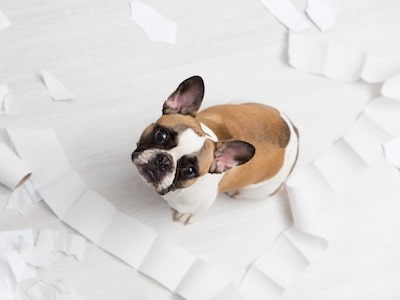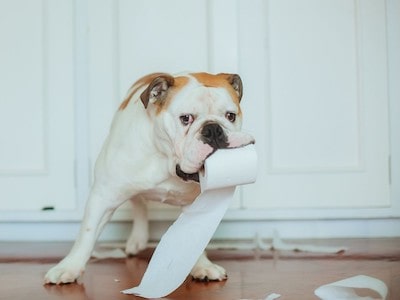Have you ever caught your furry friend munching on a piece of paper, leaving behind a trail of shredded remains? It’s a common scenario that many dog owners can relate to. But have you ever wondered why dogs have a peculiar fascination with paper?

From tissues to magazines, newspapers to cardboard, dogs seem to have an inexplicable attraction to these paper products. In this article, we’ll delve into the fascinating world of canine behavior and explore the reasons behind the puzzling question: Why do dogs eat paper?
Join us as we uncover the secrets behind this peculiar habit and gain a deeper understanding of our four-legged companions. So, grab a seat, get ready to unravel the mystery, and embark on a journey to comprehend the curious behavior of dogs and their affinity for paper.
Causes of Paper Eating in Dogs
Dogs may eat paper due to a condition called pica, which makes them crave non-food items, often due to nutritional deficiencies or medical issues. For example, dogs that are anemic or have low levels of iron in their blood may seek out paper or paper-like substances to consume. Dogs that have digestive problems or parasites may also eat paper to try to relieve their discomfort or fill their stomachs.
However, pica is not the only reason why dogs may eat paper. Some other possible reasons include:
- Anxiety and stress: When dogs are anxious or stressed, they can quickly form destructive habits, sometimes to get attention or due to boredom. This can manifest itself with things like paper shredding, and then eating the paper itself. By eating paper, it can have a calming effect on your dog, as the texture in their mouth can be soothing, as can the act of shredding before eating too.

- Curiosity and playfulness: Dogs are naturally curious and playful animals, and they may find paper products interesting or fun to explore. Some dogs love the sound and feel of tearing paper, and they may accidentally eat a small amount of it while playing. Others may be attracted by the smell or taste of paper products, especially if they have traces of food or your scent on them.
- Seeking attention: Dogs are social creatures that crave attention from their owners. Sometimes, they may resort to eating paper as a way to get your attention or reaction. This is especially true if you tend to scold them or chase them when they do it. In their minds, any attention is better than no attention.
Dogs may eat different types of paper products, such as toilet paper, paper towels, newspapers, magazines, books, etc. The type of paper they eat may depend on their preference, availability, or curiosity.
Consequences of Paper Eating in Dogs
Eating paper can be dangerous for dogs, depending on the amount and type of paper eaten, the size and health of the dog, and the speed of intervention. Some of the potential dangers include:
1) Choking: Paper can get stuck in your dog’s throat or mouth, causing them to choke or gag. This can be life-threatening if not removed quickly. If you see your dog choking on paper, try to remove it from their mouth if possible, and seek veterinary help immediately.
2) Intestinal blockage: Paper can also get stuck in your dog’s digestive tract, causing a partial or complete blockage. This can prevent food or waste from moving through the system normally.

A partial blockage may cause symptoms such as vomiting, diarrhea, loss of appetite, or abdominal pain. A complete blockage may cause more severe symptoms such as lethargy, bloating, dehydration, or shock. Both cases require immediate veterinary attention.
3) Toxicity: Depending on the type of paper your dog ate, there may be chemicals or ink in it that can be toxic to them. Printed paper poses a risk due to ink that is not meant to be ingested and can be mildly toxic if eaten in large amounts.
Paper towels typically contain formaldehyde and chlorine that are also toxic when ingested. These chemicals can cause symptoms such as vomiting, diarrhea, irritation, or allergic reactions.
Tips on How to Prevent or Deal with Paper Eating in Dogs
The best way to prevent your dog from eating paper is to keep paper products out of their reach. Store them in closed cabinets or drawers, use child-proof locks or latches on doors or trash cans, and avoid leaving paper products lying around the house.
However, keeping paper away from your dog is not enough. You also need to address any underlying issues that may be causing your dog to eat paper in the first place. Here are some tips on how to do that:
Provide your dog with appropriate toys and chews
Dogs need mental and physical stimulation to keep them happy and healthy. By providing them with toys and chews that are suitable for their size and personality, you can keep them entertained and satisfied. This will reduce their boredom and curiosity for paper products.
Ensure your dog has a balanced diet and regular check-ups
Dogs that eat paper may have nutritional deficiencies or medical issues that need to be corrected. Make sure your dog has a high-quality diet that meets their nutritional needs and consult your veterinarian for any supplements or medications they may require. Also make sure your dog has regular check-ups to detect any health problems early.
Address any behavioral or medical issues
Dogs that eat paper due to anxiety or stress need professional help to overcome their issues. You can consult a veterinarian or a certified animal behaviorist for advice on how to manage your dog’s anxiety or stress levels.
They may suggest behavioral modification techniques such as positive reinforcement training, environmental enrichment, desensitization, counterconditioning, etc., as well as medication if needed.
If your dog eats paper despite your prevention efforts, don’t panic. Here are some steps you can take to deal with it:

1) Remove the paper from their mouth if possible: If you catch your dog eating paper, try to remove it from their mouth gently if possible. Don’t force it out, as this may cause more damage. If you can’t remove it, don’t try to make them vomit, as this may also cause more harm.
2) Monitor their condition closely: If your dog has eaten paper, keep an eye on them for any signs of distress, such as choking, vomiting, diarrhea, lethargy, bloating, etc. If you notice any of these symptoms, seek veterinary help immediately. If you don’t notice any symptoms, monitor their poop for a few days.
You should see small bits of paper within their poop, indicating that it passed through their digestive tract. If you don’t see any paper in their poop, or if they become constipated, seek veterinary help as well.
3) Seek professional help if needed: If your dog has eaten a large amount of paper, or if they show any signs of distress, don’t hesitate to contact your veterinarian. They will be able to examine your dog, perform diagnostic tests, and provide appropriate treatment.
Depending on the severity of the situation, they may need to induce vomiting, administer fluids, prescribe medication, perform surgery, etc. The sooner you get help for your dog , the better their chances of recovery.
FAQ
Ingesting small amounts of paper may not cause immediate harm to dogs. However, consuming large quantities or swallowing pieces that are too big can lead to gastrointestinal issues, such as blockages or obstructions. It is essential to monitor your dog’s paper-eating habits and consult a veterinarian if you have concerns.
Occasional ingestion of small amounts of paper may not be a cause for immediate concern. However, if you notice a significant increase in paper consumption or any signs of discomfort, such as vomiting, diarrhea, or abdominal pain, it is advisable to seek veterinary attention.
Nutritional deficiencies can sometimes drive dogs to engage in unusual behaviors, including eating non-food items like paper. Ensuring your dog is on a balanced and nutritious diet recommended by a veterinarian can help reduce the likelihood of such behaviors.
In some cases, compulsive paper-eating behavior in dogs can indicate underlying medical or behavioral conditions. If your dog’s paper consumption is excessive, persistent, or accompanied by other concerning symptoms, it is advisable to consult a veterinarian for a thorough evaluation.
Conclusion
Paper eating is not a normal or healthy behavior for dogs. It can be caused by various factors, such as pica, anxiety, boredom, curiosity, playfulness, or seeking attention. It can also have serious consequences for dogs, such as choking, intestinal blockage, vomiting, diarrhea, or toxicity.
To prevent your dog from eating paper, you need to keep paper products out of their reach, provide them with appropriate toys and chews, ensure they have a balanced diet and regular check-ups, and address any underlying behavioral or medical issues. To deal with paper eating in dogs if it happens, you need to remove the paper from their mouth if possible, monitor their condition closely, and seek professional help if needed.

Ellis is a retired veterinary technician and full-time contributor at DogLovesBest. He likes writing about pet health care tips and reviews the products that are useful for fidos on a daily basis.
Ellis also guardians a Siberian husky, Nova, and a cat named Shilly. They all live happily with his wife Ammy, and both the dogs on a seaside apartment in Queens, NY.
